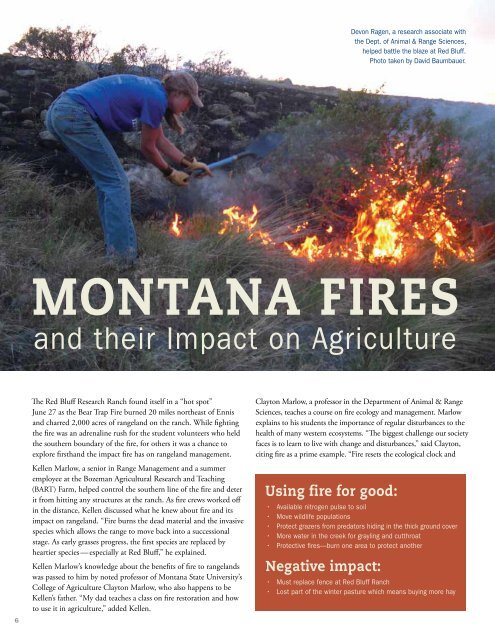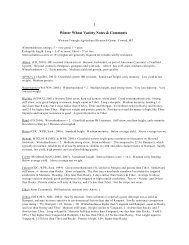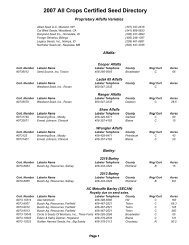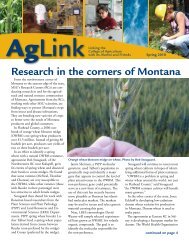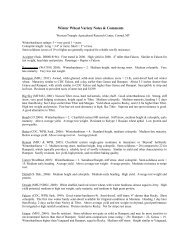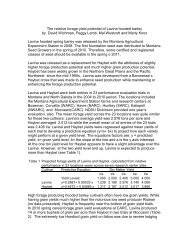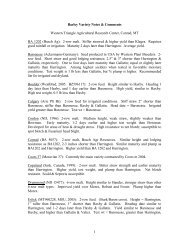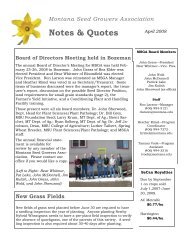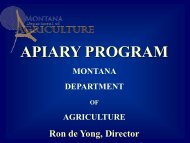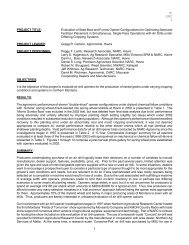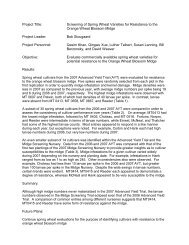Fall 2012 - College of Agriculture - Montana State University
Fall 2012 - College of Agriculture - Montana State University
Fall 2012 - College of Agriculture - Montana State University
You also want an ePaper? Increase the reach of your titles
YUMPU automatically turns print PDFs into web optimized ePapers that Google loves.
Devon Ragen, a research associate with<br />
the Dept. <strong>of</strong> Animal & Range Sciences,<br />
helped battle the blaze at Red Bluff.<br />
Photo taken by David Baumbauer.<br />
<strong>Montana</strong> Fires<br />
and their Impact on <strong>Agriculture</strong><br />
6<br />
The Red Bluff Research Ranch found itself in a “hot spot”<br />
June 27 as the Bear Trap Fire burned 20 miles northeast <strong>of</strong> Ennis<br />
and charred 2,000 acres <strong>of</strong> rangeland on the ranch. While fighting<br />
the fire was an adrenaline rush for the student volunteers who held<br />
the southern boundary <strong>of</strong> the fire, for others it was a chance to<br />
explore firsthand the impact fire has on rangeland management.<br />
Kellen Marlow, a senior in Range Management and a summer<br />
employee at the Bozeman Agricultural Research and Teaching<br />
(BART) Farm, helped control the southern line <strong>of</strong> the fire and deter<br />
it from hitting any structures at the ranch. As fire crews worked <strong>of</strong>f<br />
in the distance, Kellen discussed what he knew about fire and its<br />
impact on rangeland. “Fire burns the dead material and the invasive<br />
species which allows the range to move back into a successional<br />
stage. As early grasses progress, the first species are replaced by<br />
heartier species — especially at Red Bluff,” he explained.<br />
Kellen Marlow’s knowledge about the benefits <strong>of</strong> fire to rangelands<br />
was passed to him by noted pr<strong>of</strong>essor <strong>of</strong> <strong>Montana</strong> <strong>State</strong> <strong>University</strong>’s<br />
<strong>College</strong> <strong>of</strong> <strong>Agriculture</strong> Clayton Marlow, who also happens to be<br />
Kellen’s father. “My dad teaches a class on fire restoration and how<br />
to use it in agriculture,” added Kellen.<br />
Clayton Marlow, a pr<strong>of</strong>essor in the Department <strong>of</strong> Animal & Range<br />
Sciences, teaches a course on fire ecology and management. Marlow<br />
explains to his students the importance <strong>of</strong> regular disturbances to the<br />
health <strong>of</strong> many western ecosystems. “The biggest challenge our society<br />
faces is to learn to live with change and disturbances,” said Clayton,<br />
citing fire as a prime example. “Fire resets the ecological clock and<br />
Using fire for good:<br />
• Available nitrogen pulse to soil<br />
• Move wildlife populations<br />
• Protect grazers from predators hiding in the thick ground cover<br />
• More water in the creek for grayling and cutthroat<br />
• Protective fires—burn one area to protect another<br />
Negative impact:<br />
• Must replace fence at Red Bluff Ranch<br />
• Lost part <strong>of</strong> the winter pasture which means buying more hay


